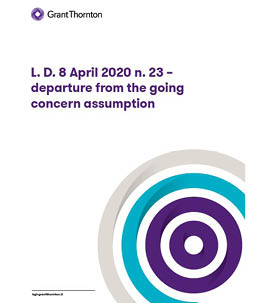-
Transactional advisory services
Find out more about the transactional advisory services of Grant Thornton Financial Advisory Services
-
Valuations
Find out more about the valuations services of Grant Thornton Financial Advisory Services
-
Mergers and acquisitions
Find out more about the merger and acquisition services of Grant Thornton Financial Advisory Services
-
Forensic and investigation services
Find out more about the forensic and investigation services of Grant Thornton Financial Advisory Services
-
Recovery & reorganisation
Find out more about the Recovery & reorganisation services of Grant Thornton Financial Advisory Services
-
Business risk services
Find out more about the business risk services of Grant Thornton Financial Advisory Services
-
Business consulting
Find out more about the business consulting services of Grant Thornton Financial Advisory Services
-
Capital market
Capital market
-
Corporate and business tax
Find out more about our corporate and business tax services.
-
Direct international tax
Find out more about our direct international tax services.
-
Global mobility services
Find out more about our global mobility services.
-
Indirect international tax
Find out more about our indirect international tax services.
-
Transfer pricing
Find out more about our transfer pricing services.
-
Litigation
Our lawyers and accountants can manage all defense measures provided not only by the Italian law, but also by EU regulations and conventions
-
Family business
Find out more about our Family business services.
-
Legal
The client can be assisted in every need and with the same care both on important operations or disputes and on simple matters

-
Back office outsourcing
Find out more about our Back office outsourcing services
-
Business process outsourcing
Find out more about our business process outsourcing services.
-
Compilation of financial statements
Find out more about our compilation of financial statements services.
-
Tax compliance
Find out more about our tax compliance services.
-
Electronic invoicing
Find out more about our electronic invoicing services
-
Electronic storage
Electronic storage is an archiving procedure that guarantees the legal validity of a digitally stored electronic document
-
Revaluation of corporate assets
Find out your civil and fiscal revaluation of tangible, intangible and financial assets
-
Human resources consulting
Find out more about our human resources consulting services.
-
Payroll
Find out more about our payroll services.
-
HR News
HR News the monthly information newsletter by Grant Thornton HR
-
Cybersecurity
GT Digital helps clients structure information security management internal functions, also through partially or totally outsourced functions
-
Agile and Programme Management
GT Digital provides support in the adoption and implementation of different portfolio management
-
Robotic Process Automation
Our “BOT Farm” can rely on digital workers able to help clients in routine activities, allowing employees to deal with more added-value activities
-
Data strategy and management
GT Digital can support clients in seizing the opportunities offered by Big Data, from the definition of strategies to the implementation of systems
-
Enterprise Resource Planning
We support clients in selecting the most appropriate ERP System according to their specific needs, helping them also understand licensing models
-
IT strategy
GT Digital supports clients in making strategic choices, identifying innovation opportunities, comparing themselves with competitors
-
IT service management
We can support with software selection and with the implementation of dedicated tools for the management of ICT processes
-
DORA and NIS 2
The entry into force of the DORA Regulation and NIS2 represents a major step towards the creation of a harmonised regulatory framework
Law Decree 8 April 2020 n. 23 – departure from the going concern underlying assumption in the preparation of financial statements
Foreword
Going Concern is the ability of an entity to last over time and "survive" in a competitive environment. In other words, it can be summarized as the ability of the company to generate revenues and related financial flows over time. In the current environment, it is clear that the above definition is unfit to many businesses that do not have, as of today, the capacity to (fore) see whether they will be generating revenues neither from an economic point of view, nor in terms of cash flows.
The underlying assumption of going concern in the preparation of financial statements is defined by article 2423-bis of the Italian Civil Code, which sets out the principles for the preparation of company financial statements. This article provides for financial statements to be drawn up on a going concern basis, while OIC 11 requires for the going concern assessment to be based on prospective data, based on reasonable assumptions useful to understand whether the company will be able to maintain an economic and financial balance for the subsequent twelve months from the FY end.
Article 7, Law Decree 8 April 2020, n. 23
The Legislator is aware of the disruptive and abnormal effects (quoting from the Explanatory Memorandum to the Law Decree dated 8 April 2020, n. 23) of the COVID-19 pandemic emergency and of the deep, though temporary, consequences this pandemic emergency can bring on going concern outlooks. The Legislator indeed acts with Chapter II of Law Decree 8 April 2020, n. 23 recorded under “Urgent measures to grant going concern of businesses hit by the COVID-19 emergency”.
In this Chapter, it introduces a set of rules whose aim is to eliminate some obligations that companies would have normally faced under difficult circumstances. In particular: articles 6 (suspension of recapitalisation obligations in the event of significant losses), 7 (dis-application of the going concern underlying assumption in the preparation of financial statements) and 8 (deferment of shareholders’ loans), whilst not overlooking article 5, which postpones the entrance into force of Legislative Decree n. 14 dated 12 January 2019 (Distress/Crisis Code).
Remaining on the subject of the going concern, Article 7 – recorded under the heading "Temporary provisions on the guiding principles for the preparation of financial statements" – sets forth that companies may draw up their financial statements for the current year ending at 31 December 2020 according to the going concern principle. This, only in case that - prior to 23 February 2020 - the company assumed to be a going concern in its final financial statements as at the FY-end date, although not formally approved yet.
The regulation introduces an option to depart from the application of art. 2423-bis, paragraph 1 of the Italian Civil Code, which requires the preparer to evaluate the items in the financial statements on the basis of the assumption that the company will continue its business under normal conditions, in the near future, without the intention, need or obligation to start any liquidation.
The exemption option introduced by the aforementioned Law Decree no. 23 of 2020, under Art.7, allows the financial statements to be valued according to a going concern assumption. This, should the company be in going concern in the last financial statements closed before February 23, 2020 – regardless from the fact these had not been formally approved yet – instead of carrying out "a prospective valuation (...) at the date of preparation of the financial statements". 23 February 2020 relates to the first measures to contain the pandemic adopted by Law Decree no.6, issued on the same date.
Italian Accounting Body (OIC) Foundation – Interpretative Document n.6
The analysis, according to a technical accounting perspective, of the rules in point was carried out in Interpretative Document no. 6, finally approved by the OIC Foundation during its meeting on 4 May 2020. The provisions of the Interpretative Document also apply to consolidated financial statements drawn up, based on the provisions of Legislative Decree no. 127 of 9 April 1991, by the Parent Company by using the aforesaid exception in its financial statements.
The OIC clarifies that the departure applies not only to current financial statements at 31 December 2020, but also to FS closed prior to 23 February 2020 and not yet approved on this date (e.g. financial statements closed at 31 December 2019) had the company expected to be a going concern at the end or the period (31 December 2019) - in compliance with paragraph 21 or paragraph 22 of OIC standard n. 11.
On the other hand, it is not possible to depart from the rule if, at the end of the financial year (e.g. 31 December 2019), the company was in the conditions described under paragraph 23 or paragraph 24 of OIC 11, namely if the going concern assumption no longer existed at that date.
The company that makes use of the exemption provided for by the law discloses information about this choice in the notes to the accounts, describing the significant uncertainties regarding the company's ability to keep being an operating economic unit aimed at generating revenues in the next foreseeable future, a period of at least twelve months from the FS date.
According to the Interpretative Document, the notes to the financial statements must also provide information on risk factors, assumptions made and uncertainties identified, as well as on future business plans devised to address these risks and uncertainties.
We would also like to highlight that the departure applies only when the management considers that the company cannot reasonably continue to operate over the next twelve months or if, under the current laws in force, it is impossible to draft the financial statements according to a going concern assumption.
Assonime (Association of Italian Joint Stock Companies) in “Impact of the COVID-19 pandemic emergency on companies’ financial statements” - Case 5/2020
It is, therefore, understood that OIC 11 par. 22 continues to apply, i.e. all companies that - while drafting the financial statements - identify significant uncertainties regarding their going concern are in all cases required to provide qualitative information on the possible economic effects on the business activity arising from the pandemic emergency. In this sense also goes the interpretation of Assonime in Impact of the COVID-19 pandemic emergency on companies’ financial statements - Case 5/2020.
It indeed stated that the regulatory provision aimed at neutralizing, by Law, the impact of the crisis in terms of changes in valuations due to the lack of going concern does not, however, allow for to the failure to disclose all the relevant information in the notes to the accounts in accordance with OIC accounting standards - namely, risk factors, assumptions made and uncertainties identified, as well as future business plans devised to address these risks and uncertainties - but it rather reinforces the need to disclose them.
Assonime, indeed analyses the effects of the pandemic emergency both considering the applicable accounting standards and the effects on financial statement disclosures.
As regards to the applicable accounting standards, companies adopting national accounting standards must refer to Article 2427, paragraph 1, no. 22 quater of the Italian Civil Code. This Article sets forth that the notes to the accounts must indicate the nature as well as the financial and economic effect of triggering events occurring after the FY-end. Reference must be made also to the OIC accounting standard n. 29, according to which the events occurring after the end of the fiscal year (either they be positive or negative) can be grouped into three sets.
The first group of events occurred after the FY-end includes events that have to be recorded in the financial statements, as they highlight conditions that already existed at the FS-date; the second group includes events that must not be posted in the financial statements because they indicate situations that arose after the FS-date; the third are subsequent events that may affect the going concern and which, as seen above, can use departures by law.
The Assonime document also mentions the position, substantially similar, taken by Consob (the Supervisory Authority for the Italian financial products market), in its warning notice no. 6/2020 of 9 April 2020. In this notice, Consob draws the attention of management and supervisory bodies, as well as of managers in charge, to the need to observe a series of standards regulating the process of disclosing financial information. For the case in point, paragraph 1 is particularly relevant.
Indeed, its subjective scope of work refers to financial reports, drafted:
- by listed issuers having Italy as their home Member State;
- by issuers of financial instruments that are widely distributed among the public, to a significant extent, pursuant to Article 116 of Legislative Decree No. 58/1998 and that apply international accounting standards.
For these entities too, Consob confirms that pandemic events are to be considered as "events occurring after the FY-end that do not imply an adjustment". Additionally, in cases of use of the so-called value use as the basis for estimating the recoverable value of fixed assets (par. 33 of IAS 36), directors must pay particular attention when disclosing detailed information on the grounding assumptions used for cash flows forecast.
Covid-19, effects on impairment testing
The outbreak of the pandemic emergency should also be analysed in the light of the provisions of OIC 9 and with reference to the preparation of the impairment test of fixed assets. The OIC Foundation published a communication on the computation of the value in use of a fixed asset in the financial statements as at 31 December 2019, reaching the conclusions already drawn by the National Foundation of Chartered Accountants with the research document dated 20 April 2020 and by Assonime with the aforementioned case 5/2020.
It is preliminarily acknowledged that facilitating a homogeneous application of the provisions of OIC 9 and OIC 29 in the financial statements as at 31 December 2019 is essential since, especially with reference to impairment, the high degree of discretion and subjectivity is clearly intensified in case of distressed companies. In particular, doubts arise whether the estimate of the value in use of a fixed asset should take into account the effects of COVID-19 or not.
The analysis of OIC 9 and in particular of paragraph 25 requires the use of current values for the purposes of the test, i.e. neither estimated improvements nor deterioration should be taken into account; this is also in line with the analysis of OIC 29 on post-FS events. Assonime also agrees that "the value in use is certainly determined on the basis of the most recent industrial plans and scenarios, but only when these are present at the end of the reporting period".
Therefore, the effects of the pandemic emergency have no impact on impairment testing to determine the value in use of a fixed asset.
Effects on supervisory bodies and third party readers of the financial statements
Corporate supervisory bodies holding office in a company that - even though at 31 December 2019 had no doubt as to its going concern - now, due to the pandemic emergency, presents significant uncertainties for the future, could not avoid issuing an unmodified opinion, although with reference an emphasis on matter, should the directors provide suitable information in the notes to the accounts and, of course, in the absence of other impeding elements.
Likewise, the more third party readers of the financial statements will be able to rely on exhaustive information in the notes to the financial statements, especially on the company's plans to overcome the crisis, the more they will be able to continue trusting the company and maintaining ordinary business relations with it.

